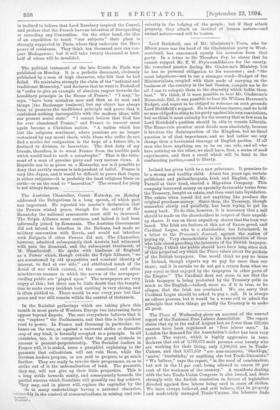The political testament of the late Comte de Paris was
published on Monday. It is a pathetic document, obviously published by a man of high character, who felt that he had failed. He maintains strongly the claim of the" national and traditional Monarchy," and declares that he went to Frohsdorf in "order to give an example of absolute respect towards the hereditary principle in the House of France." " I may," he says, " have been mistaken now and then as to men and things [the Boulanger business], but my object has always been to preserve the traditional principle and prove that it contained nothing incompatible with the modern ideas, with our present social state." " I cannot believe that God has for ever abandoned France," and France to recover mast again become a Christian nation. "A nation which has lost the religious sentiment, where passions are no longer restrained by any moral check, while those who suffer do not find a motive for resignation in the hope of a future life, is destined to division, to laceration. The first duty of my friends, therefore, is to wrest France from the terrible path which would lead to such a catastrophe." That is the testa- ment of a man of genuine piety and very narrow views. A Republic can be as pious as a Monarchy, nor is it possible to deny that earthly success is independent of belief. France is very like Japan, and it would be difficult to prove that Japan is either religious—it is probably the least religious State on earth—or on the road to "laceration." The reward for piety is not always fatness.


































 Previous page
Previous page